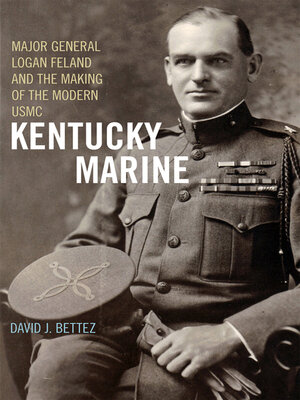Kentucky Marine
ebook ∣ Major General Logan Feland and the Making of the Modern USMC
By David J. Bettez

Sign up to save your library
With an OverDrive account, you can save your favorite libraries for at-a-glance information about availability. Find out more about OverDrive accounts.
Find this title in Libby, the library reading app by OverDrive.



Search for a digital library with this title
Title found at these libraries:
| Library Name | Distance |
|---|---|
| Loading... |
"Follows the changes in the Marine Corps from its role as colonial infantry to amphibious assault force . . . us[ing] the career of Maj. Gen. Logan Feland." —Allan R. Millett, author of Semper Fidelis
Winner of the Marine Corps Heritage Foundation's Colonel Joseph Alexander Award
A native of Hopkinsville, Kentucky, Major General Logan Feland (1869-1936) played a major role in the development of the modern Marine Corps. Highly decorated for his heroic actions during the battle of Belleau Wood in World War I, Feland led the hunt for rebel leader Augusto César Sandino during the Nicaraguan revolution from 1927 to 1929—an operation that helped to establish the Marines' reputation in guerrilla warfare and search-and-capture missions. Yet, despite rising to become one of the USMC's most highly ranked and regarded officers, Feland has been largely ignored in the historical record.
In Kentucky Marine, David J. Bettez uncovers the forgotten story of this influential soldier of the sea. During Feland's tenure as an officer, the Corps expanded exponentially in power and prestige. Not only did his command in Nicaragua set the stage for similar twenty-first-century operations in Iraq and Afghanistan, but Feland was one of the first instructors in the USMC's Advanced Base Force, which served as the forerunner of the amphibious assault force mission the Marines adopted in World War II.
Kentucky Marine also illuminates Feland's private life, including his marriage to successful soprano singer and socialite Katherine Cordner Feland, and details his disappointment at being twice passed over for the position of commandant. Drawing from personal letters, contemporary news articles, official communications, and confidential correspondence, this long-overdue biography fills a significant gap in twentieth-century American military history.
Winner of the Marine Corps Heritage Foundation's Colonel Joseph Alexander Award
A native of Hopkinsville, Kentucky, Major General Logan Feland (1869-1936) played a major role in the development of the modern Marine Corps. Highly decorated for his heroic actions during the battle of Belleau Wood in World War I, Feland led the hunt for rebel leader Augusto César Sandino during the Nicaraguan revolution from 1927 to 1929—an operation that helped to establish the Marines' reputation in guerrilla warfare and search-and-capture missions. Yet, despite rising to become one of the USMC's most highly ranked and regarded officers, Feland has been largely ignored in the historical record.
In Kentucky Marine, David J. Bettez uncovers the forgotten story of this influential soldier of the sea. During Feland's tenure as an officer, the Corps expanded exponentially in power and prestige. Not only did his command in Nicaragua set the stage for similar twenty-first-century operations in Iraq and Afghanistan, but Feland was one of the first instructors in the USMC's Advanced Base Force, which served as the forerunner of the amphibious assault force mission the Marines adopted in World War II.
Kentucky Marine also illuminates Feland's private life, including his marriage to successful soprano singer and socialite Katherine Cordner Feland, and details his disappointment at being twice passed over for the position of commandant. Drawing from personal letters, contemporary news articles, official communications, and confidential correspondence, this long-overdue biography fills a significant gap in twentieth-century American military history.







